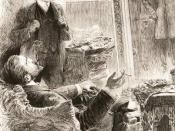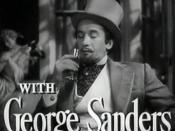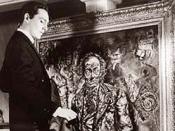Aestheticism figures prominently in both The Picture of Dorian Gray and The Love Song of J. Alfred Prufrock; each work, however, has a specific paradigm: Dorian Gray has aestheticism as the subjective merit of beauty independent of its reality, whereas Prufrock has aestheticism as a sordid quality, all too present within modern culture. The drawing rooms of Prufrock are listless, full of desultory imagery; while in Dorian Gray they are alive: the idle bandying of public art and popular philosophy becomes vivid, a vehicle for wit.
The historical context of the works, the background which is referenced throughout, is the same; while separated by several decades, both works address cultures remarkably similar, cultures in which high society is indulgent to the exclusion of realism. Aestheticism in The Picture of Dorian Gray is an intellectual rejection of the contemporary realities of society. From the beginning of Dorian Gray, Lord Henry is identified as an intellectual by his linguistic virtuosity, but only later is the full complexity of his character is revealed.
In his speeches he expresses strident viewpoints, often revolting to common sensibilities, but representative of aestheticism in that the aesthetic qualities are gained from the fascination and amusement of others at his artifice. His viewpoints often contradict and rarely present practical criticism--indeed, are not intended to--because they are thoroughly aesthetic. Lord Henry falls within Oscar Wilde's definition of art; which is especially evident with his assurances to Dorian Gray, where he repeats, again and again, the superiority of beauty, and that Dorian Gray has an "innocent" face. After all, to find ugliness within beauty is, according to Wilde, to be corrupt. Lord Henry's lifestyle is representative of the aesthetic movement; he is both sincere and detached while speaking, as if in conversation he sees himself talking inexorably and feels...


